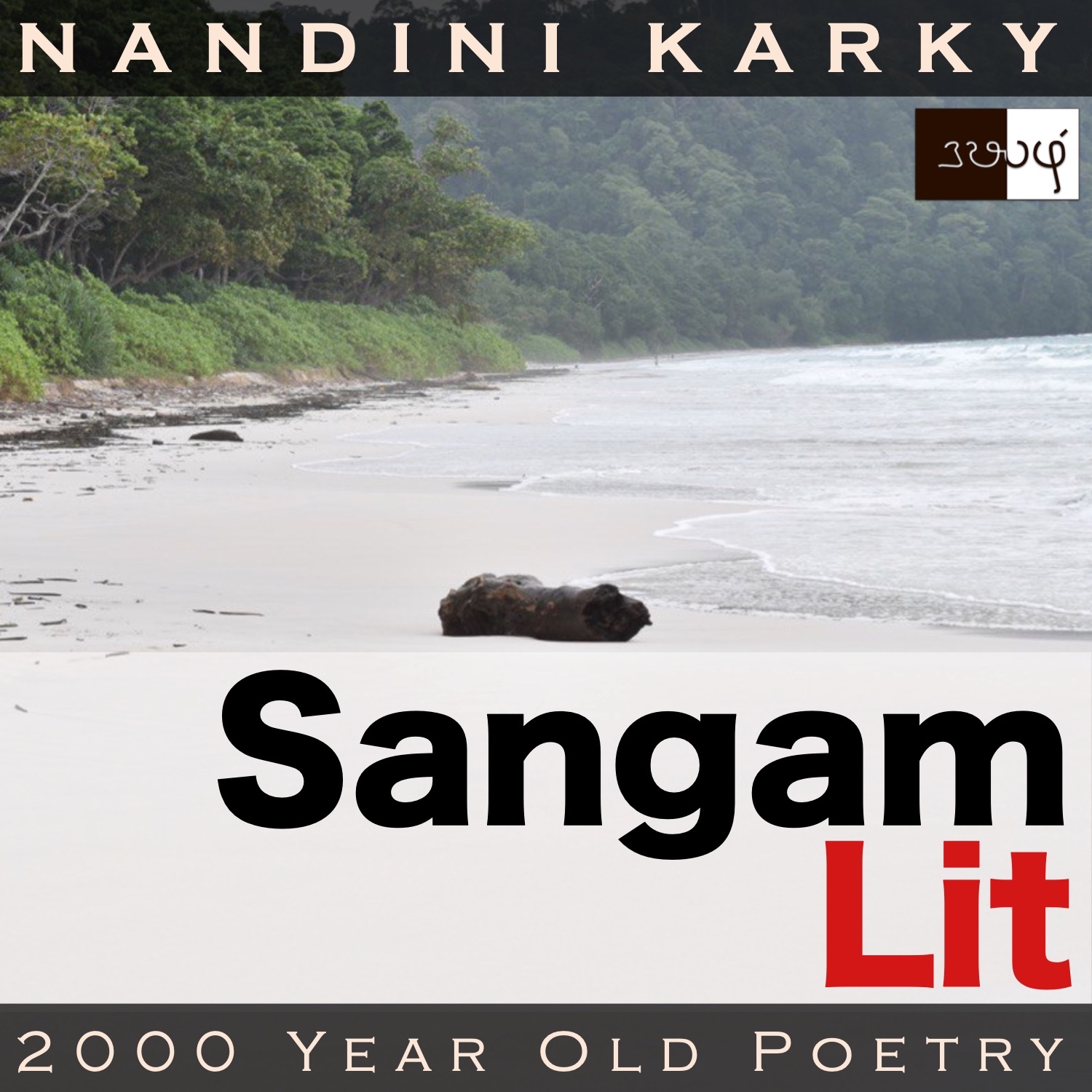Podcast: Play in new window | Download
Subscribe: Apple Podcasts | Spotify | Amazon Music | Android | iHeartRadio | TuneIn | RSS | More

In this episode, we perceive the activities of a young man courting a girl by the seashore, as portrayed in Sangam Literary work, Natrinai 349, penned by Milai Kilaar Nalvettanaar. Set in the coastal regions of ‘Neythal’, the verse speaks in the voice of the man, passing on a pointed message to the confidante, listening nearby.
கடுந் தேர் ஏறியும், காலின் சென்றும்,
கொடுங் கழி மருங்கின் அடும்பு மலர் கொய்தும்,
கைதை தூக்கியும், நெய்தல் குற்றும்,
புணர்ந்தாம் போல, உணர்ந்த நெஞ்சமொடு
வைகலும் இனையம் ஆகவும், செய் தார்ப்
பசும் பூண் வேந்தர் அழிந்த பாசறை,
ஒளிறு வேல் அழுவத்துக் களிறு படப் பொருத
பெரும் புண்ணுறுநர்க்குப் பேஎய் போல,
பின்னிலை முனியா நம்வயின்,
என் என நினையும்கொல், பரதவர் மகளே?
The verse opens with ‘கடுந் தேர் ஏறியும்’ meaning ‘riding fast chariots’ and brings to fore, the swanky cars in the Sangam era. Thereafter, we encounter ‘அடும்பு மலர்’ or ‘beach morning glory flowers’, ‘கைதை’ or ‘the pandanus tree’, known for its fragrant flowers, and ‘நெய்தல்’ or ‘blue lotus’. In short, a bouquet of the choicest flowers by the sea. From this sensually delightful locale, the scene shifts to ‘வேந்தர் அழிந்த பாசறை’ meaning ‘a battlefield where kings have been destroyed’. In tandem with this sombre mood, appears ‘பெரும் புண்ணுறுநர்’ or ‘those who have searing wounds’ in the company of ‘பேஎய்’ or ‘demon spirit’. Starting in a romantic mood, the song has then ventured into the horror genre. Ending with ‘என் என நினையும்கொல், பரதவர் மகளே’ meaning ‘what could be in her mind, that daughter of fisherfolk’, the verse beckons us within the heart of the verse.
The man had met the lady in a seashore grove and fallen in love with her. The lady too reciprocated his feelings. In spite of these positive developments, the man knows well that unless he wins the confidence of the confidante, he cannot make headway in his relationship with the lady. Although the man has been attempting to convince the confidante, she shows no sign of accepting his requests and this is because, the lady has not openly declared her love for the man to her friend, owing to her innate shyness. In the midst of these circumstances, seeing the confidante pass by, the man speaks to himself saying, “Riding speedy chariots and walking on foot, on the paths in this curved marshland, I picked ‘adumbu’ flowers for her, bent the branches of the ‘kaidhai’ tree and also plucked blue lotuses. My heart delighted as if I were one with her. And, this has been happening every day. In a battlefield, where kings, wearing rich gold ornaments and well-woven garlands, have been killed in a sea of spears, and where, behind fallen warriors with deep wounds, who have battled such that even elephants are destroyed, a demon spirit stands in protection. Akin to that, I have been walking behind her, without grudging this state. I wonder what may she be thinking, that daughter of fisherfolk?” With these words, the man clearly states to the confidante that he knows the lady well and places a forceful request seeking the confidante’s help in furthering his relationship with the lady.
Now, for the nuances! The man starts by talking about how he arrives riding fast horses and this is a marker for the affluence of his family and then he lowers himself on foot to do the bidding of the lady. This turns out to be choosing the brightest beach morning glory flowers from the vines and then, curving the branch of a pandanus tree, so that the lady can pick its flower, and also, wading into pools to pluck blue lotuses for the lady. After mentioning all these activities, he expresses the joy he felt in doing this for the lady and adds that this has been happening day in and day out. Then, you hear a subtle ‘and yet…’. Following the trail of this sigh, we find ourselves in the middle of a raging battlefield, where you see kings, well-decked with jewels and garlands, falling to the ground on one side, elephants being felled by spears on the other side, and the most striking image of all – that of a demon spirit, standing behind fallen warriors, who have deep slashes on their skin. The man mentions this act of the spirit standing behind a wounded warrior to equate to the way he has been walking behind the lady, at her beck and call. He says he does not mind this state of lowering himself for the one he loves and finishes wondering, in spite of all that he does for her, what was truly in the lady’s heart.
Although the man seems to be talking about the lady and his pursuit of her, he is in fact, referring to the way he has been lowering himself and beseeching the help of the confidante to no heed. In the scene from the battlefield, the man remarks how when there is no one to help a wounded soldier, even a demon spirit takes pity and stands in guard, whereas the confidante was so unrelenting even though the man is in such a state of love for the lady. He intends to strike at the core of the confidante’s heart and win her over, by revealing his adoration for the lady and chiding her for not having the kindness of that demon spirit! Wonder if the verse is indicating a belief in the supernatural or could the terms have meant something else entirely? Whatever be the truth, one thing is certain, and that is, death and destruction on a battlefield. Hope humanity learns more elegant methods of resolving conflicts without resorting to the devastation of war!




Share your thoughts...